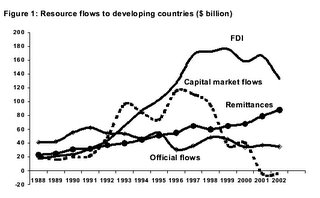Philippine Mudslide: Rebuilding and Migrant Workers’ Remittances
My heart goes out to the victims of the unbelievable mudslide in the island of Leyte, in the Philippines. After years of illegal logging and environmental degradation, it appears that the mountain gave out after heavy rains:
"The disaster is being blamed on two weeks of heavy rain and the replacement of the deep-rooted hillside forests with coconut plantations, which have shallower roots and cannot hold soil. Illegal logging is rampant across much of the Philippines, but it is unclear whether the clearances in this area were carried out illegally."
Here is a case where natural resources benefited a few (legally or otherwise), and now the rest of the Philippines is left to deal with the consequences. In some of the remote areas of the planet, illegal logging literally puts entire towns and villages at risk. Logging needs to be subject to environmental oversight: if any industry can benefit from The Triple Bottom Line approach, logging is it.
After mourning their losses, comes rebuilding. OXFAM is one of many possible relief groups one can donate to, and make no mistake, donations will be needed. If the results of a recent study are to be believed, remittances from Overseas Filipino Workers will also play a big role:
Disaster damages due to hurricanes appear to lead to sizeable increases in net financial inflows from several sources: international development assistance, migrants’ remittances, foreign lending, foreign direct investment. This is interpreted as strong evidence of an insurance mechanism operating at an international level and capable of covering around 43% of the disaster damage in the same year of the disastrous event, and up to 85% within four years. Funds from all sources substantially contribute to this result, with a prominent role for migrant workers’ remittances.
In developing countries like the Philippines, the remittance of their overseas workers are a vital part of the economy. Overseas workers, from several Asian countries, contribute to the economies of the oil-rich Gulf States, and they are also valued in developed countries in the West and the emerging economies of East Asia. The Manila-based Asian Development Bank (the Asian version of the World Bank) even has a program devoted to tracking this important sector. Here is a graph indicating the size of these remittances, relative to, Foreign Direct Investments (FDI) and Capital Market Inflows. As the graph illustrates, these remittances are nontrivial.

"Migration, whether permanent or temporary is a global phenomenon with individuals from developing countries relocating to higher income areas such as the United States and the European Union in the hope for a better future. Migrant workers remit funds to their home countries to support family members left behind. The amount of remittances represents a significant flow of income to poor families. If channeled in a more efficient and reliable manner, it can considerably contribute to alleviation of poverty and a country's development."


0 Comments:
Post a Comment
<< Home